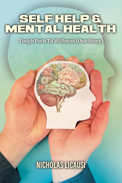
 |
Self Help and Mental Health: Tough Path to Wellness (Our Story)
by Nicholas Licausi
Inks and Bindings
Author Licausi successfully arrays his subjective experience and diligent, objectively researched knowledge of mental illnesses and the ways that they affect not only patients but also their families, pointing toward possible ameliorations of current approaches. Much of the information gathered concerns Licausi’s own experience as someone who was diagnosed with and treated for schizophrenia and related mental and psychological issues. But importantly, the author also takes a broader look as part of his stated hope to assist others who may find themselves similarly distressed. He has partnered in this composition with his father, who contributes comments on such significant factors as his son’s residence in various hospital facilities, insurance issues, and the social context of parenting a person with diagnosed mental illness.
Raised in what could have been an ideal family, with well-educated parents who had high hopes for their son’s life progress, Licausi’s diagnosis created numerous unforeseen difficulties. One factor that could have triggered schizophrenia was smoking pot, which, the author says, might have resulted in the disease’s prodromal, or initial stages, and were a warning sign to his parents. When further medical investigation resulted in a diagnosis of schizoaffective disorder, Licausi was placed in a mental health facility. He would have both medical and legal battles to look back upon. He has determined that a cure for schizophrenia must be found, along with a wider understanding of what it means when a schizophrenic person is in remission, striving to improve one’s general life circumstances.
Throughout this lively biographical narrative, peppered with offerings from his father, are references to a healthy diet, useful herbal supplements as well as prescribed medications, and the necessity for a "Medical Computer," the description of which comprises the book’s final chapter. Licausi firmly believes that the development of such a computer could save lives and enhearten families by allowing individuals to analyze all medical disabilities and find suitable paths to remission and long-term fulfillment. He suggests that readers think of this as “a spiritual awakening” underpinned by the latest technologies and the growth of new, rational medical systems.
Licausi has examined his subjects thoroughly, having written previously on these themes and having personally undergone the losses and gains that provide this work’s focus. Though it was doubtless difficult to piece together, Licausi avers that he and his father enjoyed the process of producing this unique and potentially highly assistive treatise. The proposed creation of a new medical product that allows the patient to make more choices reveals Licausi’s wide range of technical understanding and has garnered attention among certain factions that may help to make this well-considered ideation a reality. Licausi’s far-reaching pragmatic proposals here intertwine with his emotive memoir of the often-crushing effects of mental illness and the barriers to and opportunities offered through its varying phases. His work is designed to assist and encourage those with the types of diagnoses he was given, as well as those who, like him, have the innate curiosity and persistence to explore more thoroughly significant medical system issues and advocate for the sorts of potential improvements he has so persuasively put forward.
RECOMMENDED by the US Review